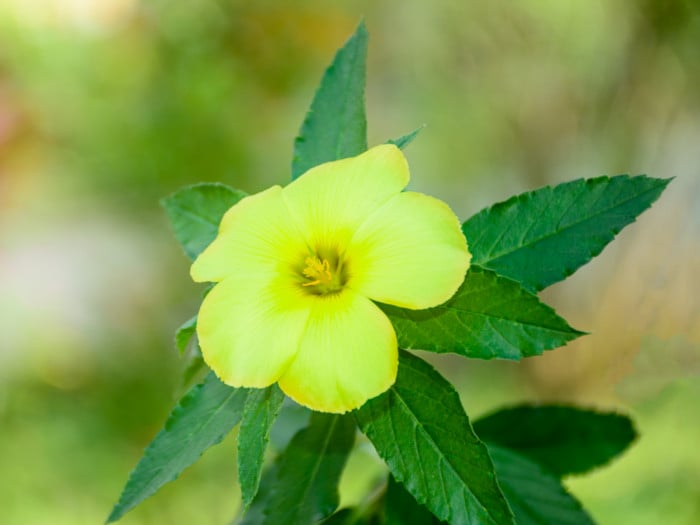The use of damiana is popular in some parts of the world, but its potential health effects have made it more sought after in recent years.
What is Damiana?
Damiana (Turnera diffusa)is a woody shrub native to southern North America, Central America, South America, and the Caribbean. This shrub bears small flowers followed by small fruits, and various parts of this plant have been a part of traditional medicine for thousands of years. The main part of the plant used for herbal remedies are the leaves, as they contain the pharmacologically active elements of this plant. These elements include flavonoids, tannins, phenolic compounds, caffeine, fatty acids, thymol, and beta-carotene, among others. [1] [2]
These leaves, being an aphrodisiac, have long been associated with relaxation, as well as increases in sexual libido. Some people also smoke damiana leaves, as it can have a similar effect to marijuana; as with smoking any herbal substance, some damage to the lungs may be experienced. Due to its connection with marijuana and its recreational uses, it is illegal in some parts of the United States but is generally legal in most countries.

Damiana is a low-growing plant with yellow flowers and fragrant leaves. Photo Credit: Shutterstock
Damiana Benefits
There are quite a few benefits associated with damiana, including its ability to boost male and female sexual health, prevent bladder infections, and reduce stress, among others.
- As an aromatase inhibitor, it can increase the production of testosterone B in men
- As an aphrodisiac, it can increase sexual libido in both men and women [3]
- Aid in weight loss by boosting the metabolism and increasing fat-burning potential [4]
- Steady mental health by alleviating stress and anxiety, and balancing hormones
- Ease constipation and indigestion; functions as a natural laxative [5]
- Relieve headaches and migraines
- Promote antioxidant activity and minimize the damage done by free radicals
- Soothe asthma symptoms
- Prevent bedwetting in children and the elderly
- Ease difficult menstruation symptoms, such as mood swings and cramps
- Strengthen the immune system with antibacterial and antiviral elements
- Protect vision thanks to high levels of beta-carotene
- Treat stomach ulcers
- Prevent urinary tract infections (UTI) among women
Damiana Dosage
If you are going to take damiana, it is important that you use only the recommended amount to avoid side effects. Most experts recommend that the daily dose of damiana supplement not exceed 1200 milligrams of the extract per day. Many manufacturers sell capsules ranging from 200-400 milligrams of the extract and recommend taking them 1-3 times per day, particularly for male enhancement. [6]
Damiana Uses
For medicinal and herbal purposes, you can find damiana in the following forms: [7]
- Tincture
- Fluid extract
- Tea or infusion
- Capsules
- Tablets
The sharp, spicy odor and flavor make it a popular cooking herb in some parts of Mexico, and it plays a part in liquor production, namely for triple sec.
If you are growing your own damiana, dry the leaves thoroughly after harvesting and then store them in a cool, dark place before using them for teas and tinctures.
Damiana Side Effects
While this herb is widely praised for its many powerful effects, there are some side effects to consider before using damiana.
- If you are pregnant or breastfeeding, the effects it can have on your hormonal levels could be potentially dangerous.
- If you are anemic, some research has found that this herb can negatively impact iron absorption.
It is often used in place of marijuana, but when smoked in excess, it can result in anxious behavior, rather than functioning as a sedative or anxiolytic.
